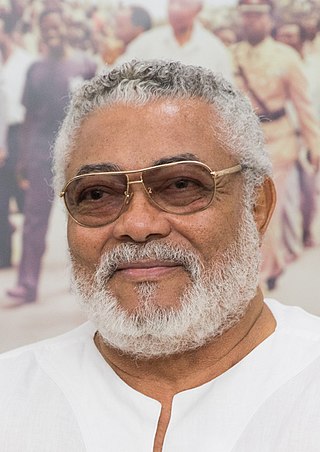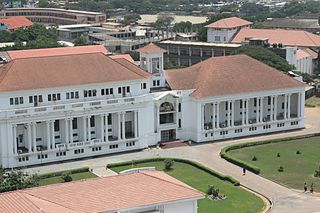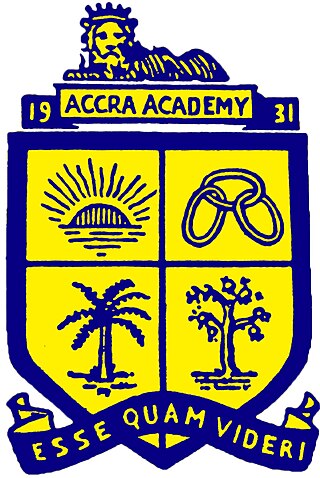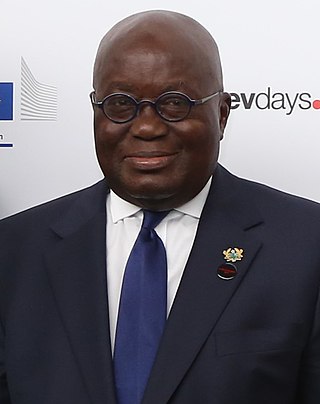
Ghana, officially the Republic of Ghana, is a country in West Africa. It lies adjacent to the Gulf of Guinea and the Atlantic Ocean to the south, sharing a border with Ivory Coast in the west, Burkina Faso in the north, and Togo in the east. Ghana covers an area of 239,567 km2 (92,497 sq mi), spanning diverse ecologies, from coastal savannas to tropical rainforests. With nearly 35 million inhabitants, Ghana is the second-most populous country in West Africa. The capital and largest city is Accra; other significant cities include Kumasi, Tamale, and Sekondi-Takoradi. In 1957 Ghana became the first colony in Sub-Saharan Africa to achieve sovereignty, under the leadership of Kwame Nkrumah.
The economy of Ghana has a diverse and rich resource base, including the manufacturing and export of digital technology goods, automotive and ship construction and export, and the export of resources such as hydrocarbons and industrial minerals.

Politics of Ghana takes place in a framework of a presidential representative democratic republic, whereby the president of Ghana is both head of state and head of government, and of a two party system. The seat of government is at Golden Jubilee House. Executive power is exercised by the government. Legislative power is vested in both the government and Parliament. The judiciary is independent of the executive and the legislature.
Freedom of information laws allow access by the general public to data held by national governments and, where applicable, by state and local governments. The emergence of freedom of information legislation was a response to increasing dissatisfaction with the secrecy surrounding government policy development and decision making. In recent years Access to Information Act has also been used. They establish a "right-to-know" legal process by which requests may be made for government-held information, to be received freely or at minimal cost, barring standard exceptions. Also variously referred to as open records, or sunshine laws, governments are typically bound by a duty to publish and promote openness. In many countries there are constitutional guarantees for the right of access to information, but these are usually unused if specific support legislation does not exist. Additionally, the United Nations Sustainable Development Goal 16 has a target to ensure public access to information and the protection of fundamental freedoms as a means to ensure accountable, inclusive and just institutions.

Jerry John Rawlings was a Ghanaian military officer, aviator and politician who led the country for a brief period in 1979, and then from 1981 to 2001. He led a military junta until 1992, and then served two terms as the democratically elected president of Ghana. He was the longest-serving leader in Ghana's history, presiding over the country for 20 years.

Lesbian, gay, bisexual, and transgender (LGBTQ) people in Ghana face severe challenges not experienced by non-LGBTQ residents. Sexual acts between males have been illegal as "unnatural carnal knowledge" in Ghana since the colonial era. The majority of Ghana's population hold anti-LGBTQ sentiments. Physical and violent homophobic attacks against LGBTQ people occur, and are often encouraged by the media and religious and political leaders. At times, government officials, such as police, engage in such acts of violence. Young gay people are known to be disowned by their families and communities and evicted from their homes. Families often seek conversion therapy from religious groups when same-sex orientation or non-conforming gender identity is disclosed; such "therapy" is reported to be commonly administered in abusive and inhumane settings.

The Supreme Court of Ghana is the highest judicial body in Ghana. Ghana's 1992 constitution guarantees the independence and separation of the Judiciary from the Legislative and the Executive arms of government.

Political corruption in Ghana has been common since independence. Since 2017, Ghana's score on Transparency International's Corruption Perceptions Index has improved slightly from its low point that year, a score of 40 on a scale from 0 to 100. Ghana's score rose to 43 by 2020 and has remained there until the present, 2023. When ranked by score among the 180 countries in the 2023 Index, Ghana ranked 70th, where the country ranked first is perceived to have the most honest public sector. For comparison with worldwide scores, the best score was 90, the average score was 43, and the worst score was 11. For comparison with regional scores, the average score among sub-Saharan African countries was 33. The highest score in sub-Saharan Africa was 71 and the lowest score was 11.

Vodafone Ghana, formerly Ghana Telecom, is the national telecommunications company of Ghana.

Ghanaian passports are issued exclusively by the Ministry of Foreign Affairs and Regional Integration to Ghanaians granted citizenship in accordance with the Ghanaian nationality law. There are three types of passport booklets – contemporary (regular), service, and diplomatic passports. Ghanaian passport booklets are valid for travel by Ghanaians anywhere in the world, although the holder may need to obtain a visa from the destination country when travelling for some purposes. More than one valid Ghanaian passport of the same type may not be held.

The Constitution of Ghana is the supreme law of the Republic of Ghana. It was approved on 28 April 1992 through a national referendum after 92% support. It defines the fundamental political principles, establishing the structure, procedures, powers and duties of the government, structure of the judiciary and legislature, and spells out the fundamental rights and duties of citizens. It is made up of 26 chapters, not including the preamble.

Accra Academy is a boys' high school located at Bubuashie near Kaneshie in the Greater Accra Region, Ghana. It admits both boarding and day students. Founded as a private school in 1931, it gained the status of a Government-Assisted School in 1950. It is the oldest existing high school to have been privately founded in the Gold Coast.
The Institute of Economic Affairs (IEA), Ghana, is a public policy think tank based in Accra, Ghana. It is known to be Ghana's premier public policy institute. It was founded by a Ghanaian economist, Dr. Charles Mensa in 1989 at a time when the country was governed by a military regime. The IEA was set up as an independent, non-government institution dedicated to the establishment and strengthening of a market economy and a democratic, free and open society. The IEA supports research, promotes and publishes studies on economic, socio-political and legal issues in order to enhance understanding of public policy.
The Ghana Library Authority, established in 1950 as the Ghana Library Board, was the first public library service in sub-Saharan Africa. The public library movement in Ghana began in 1928, as a personal effort of the then Anglican Bishop Orfeur Anglionby of Accra. In 1946, the Aglionby Library Management Committee worked with the British Council Advisory Committee, towards library development in the then Gold Coast. In 2018 President Nana Addo Dankwa Akufo Addo appointed a Ghanaian Social Entrepreneur, Hayford Siaw as GhLA Chief Executive Officer. In May 2021, the Authority was shortlisted for the LBF International Excellence Awards in the 'Library of the Year' Category.

Oral Kwame Ofori, professionally known as Oral Ofori, is a Ghanaian-American award-winning digital media producer and blogger, freelance journalist, entrepreneur, and writer. Born in Tema, he is also the founder of the US-based communication consultancy TheAfricanDream LLC. In February 2018 Ofori took on a language interpretation job as a level II interpreter of the Twi and Ga language with the Fairfax County Public Schools system. In December 2021 Mr. Ofori started work with the Embassy of Ghana, Washington, D.C. as Head of the Customer Relations Office under Ambassador Alima Mahama. In February 2024 Mr Ofori's firm TheAfricanDream LLC partnered the Washington DC government in the United States to provide media for the event dubbed Africa on the Avenue to support local businesses.

Crime in Ghana is investigated by the Ghana Police Service.

The Sustainable Development Goals and Ghana describes how the Sustainable Development Goals are being implemented in Ghana. The SDGs are also known as the 2030 Agenda for Sustainable Development and are a set of seventeen global goals for 169 specific areas developed by the United Nations. The Sustainable Development Goals were formed in Rio de Janeiro in 2012 at the UN Conference on Sustainable Development. Its aimed to produce a set of universal goals claimed to meet the urgent environmental, economic and political problems facing the world.

The Government of Ghana initially responded to the virus through a nationwide disinfection and fumigation exercise which began in April 2020. In order to curb the spread of the virus, the government enforced lockdowns, aggressive contact tracing, public bans and social measures such as encouraging the wearing of face masks. By April, it began the gradual reopening of the country; lifting all lockdowns while maintaining protocols such as social distancing. Throughout the pandemic, the government partnered with the private sector in order to roll out economic reliefs and recovery programs as a result of the impact of the pandemic on Ghana's economy. There was also an expansion of medical facilities and the improvement of testing logistics.

The presidency of Nana Akufo-Addo began on 7 January 2017. Following the 2016 Ghanaian general elections, Nana Akufo-Addo the flag-bearer of the New Patriotic Party, succeeded John Mahama as the 5th President of the Ghanaian Fourth Republic after winning by a landslide. He won a second term on 9 December 2020 in a tightly contested race against National Democratic Congress (NDC) candidate and former president, John Mahama.

The Ghanaian anti-LGBT bill is a proposed law in Ghana that would introduce wide-ranging restrictions on LGBT+ rights. The bill was approved by the Parliament of Ghana on 28 February 2024 with bipartisan support, and will only come into effect if signed into law by president Nana Akufo-Addo.












